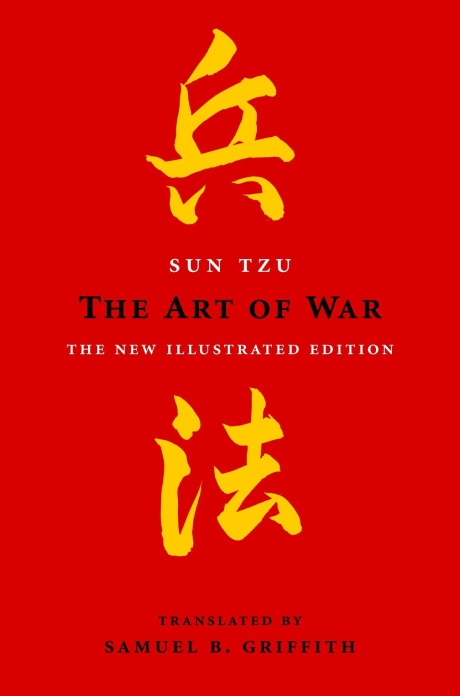The Art of War
"The Art of War," attributed to the ancient Chinese military strategist Sun Tzu (also known as Sunzi or Sun Wu), is a classic on warfare and strategy. Written over two thousand years ago, it remains a timeless guide to the principles of warfare and, more broadly, the art of strategy applicable to various aspects of life.
Book Summary:
- Winning Without Fighting:
The highest form of warfare is to achieve victory without engaging in direct conflict. Strategic planning and understanding the battlefield conditions are crucial for success. - Five Factors of Victory:
The Way (morale), Heaven (weather and terrain), Earth (distance and terrain), the General (leadership), and Method (discipline and organization) are the key factors that determine success in warfare. - Importance of Preparation:
Thorough preparation is essential, and every battle is considered won or lost before it begins. Planning, intelligence gathering, and adapting strategies to specific circumstances are critical elements. - Deception and Espionage:
Sun Tzu advocates for the use of deception and espionage. The ability to appear weak when strong and vice versa can confuse and defeat the opponent. Spies play a crucial role in gathering intelligence. - Flexibility and Adaptation:
The ability to adapt and change strategies based on the evolving situation on the battlefield is emphasised. Being flexible, responsive, and agile allows for the exploitation of opportunities.
Lessons Learnt:
- Strategic Thinking:
"The Art of War" teaches the importance of deep strategic thinking. Understanding the broader context and planning ahead are fundamental to achieving success. - Adaptability:
The ability to adapt to changing circumstances is crucial. Flexibility in strategies allows for an effective response to opportunities and challenges. - Preparation and Intelligence:
Thorough preparation and intelligence gathering are key components of success. Being well-informed and understanding the environment are critical aspects of strategic planning. - Importance of Leadership:
The role of the general (leader) is highlighted as a critical factor in victory. Effective leadership involves making wise decisions and inspiring confidence in the team. - Minimising Conflict:
Sun Tzu's philosophy emphasizes achieving goals with minimal conflict. This is achieved through careful planning, understanding the opponent, and using strategic principles to gain an advantage.
"The Art of War" is a foundational text on strategy, often applied not only in military contexts but also in business, politics, and everyday life. Its teachings emphasise the importance of deep strategic thinking, planning, and adaptability to achieve success while minimising conflict. We certainly enjoyed the read, we hope you do too.
The Art of War

"The Art of War," attributed to the ancient Chinese military strategist Sun Tzu (also known as Sunzi or Sun Wu), is a classic on warfare and strategy. Written over two thousand years ago, it remains a timeless guide to the principles of warfare and, more broadly, the art of strategy applicable to various aspects of life.

Book Summary:
- Winning Without Fighting:
The highest form of warfare is to achieve victory without engaging in direct conflict. Strategic planning and understanding the battlefield conditions are crucial for success. - Five Factors of Victory:
The Way (morale), Heaven (weather and terrain), Earth (distance and terrain), the General (leadership), and Method (discipline and organization) are the key factors that determine success in warfare. - Importance of Preparation:
Thorough preparation is essential, and every battle is considered won or lost before it begins. Planning, intelligence gathering, and adapting strategies to specific circumstances are critical elements. - Deception and Espionage:
Sun Tzu advocates for the use of deception and espionage. The ability to appear weak when strong and vice versa can confuse and defeat the opponent. Spies play a crucial role in gathering intelligence. - Flexibility and Adaptation:
The ability to adapt and change strategies based on the evolving situation on the battlefield is emphasised. Being flexible, responsive, and agile allows for the exploitation of opportunities.
Lessons Learnt:
- Strategic Thinking:
"The Art of War" teaches the importance of deep strategic thinking. Understanding the broader context and planning ahead are fundamental to achieving success. - Adaptability:
The ability to adapt to changing circumstances is crucial. Flexibility in strategies allows for an effective response to opportunities and challenges. - Preparation and Intelligence:
Thorough preparation and intelligence gathering are key components of success. Being well-informed and understanding the environment are critical aspects of strategic planning. - Importance of Leadership:
The role of the general (leader) is highlighted as a critical factor in victory. Effective leadership involves making wise decisions and inspiring confidence in the team. - Minimising Conflict:
Sun Tzu's philosophy emphasizes achieving goals with minimal conflict. This is achieved through careful planning, understanding the opponent, and using strategic principles to gain an advantage.
"The Art of War" is a foundational text on strategy, often applied not only in military contexts but also in business, politics, and everyday life. Its teachings emphasise the importance of deep strategic thinking, planning, and adaptability to achieve success while minimising conflict. We certainly enjoyed the read, we hope you do too.
